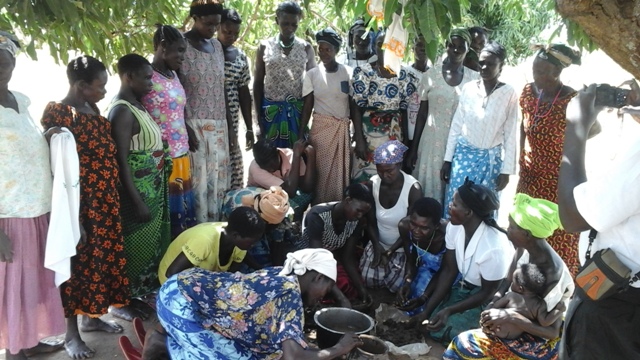Microeconomic Groups
In April 2012, the late Alec Johnson proposed to the St. Augustine Community Love Programme a structure for village-based cooperative savings and loan groups, based on local culture, to provide capital for small craft projects making items to be sold in the market for cash. Over 250 groups were formed, and some of these groups did very well. In 2023, a new Uganda NGO was formed, Amazing Love Uganda (ALU), to coordinate economic and financial training among these groups to strengthen their financial management.
Community groups, typically up to 30 women, pay a small amount into a common revolving fund to establish a partnership. Those funds are added to a one-time sponsorship from someone like you. The members then work together in multiple local entrepreneurial projects. Each member uses the fund to purchase supplies, then replenishes it plus a contribution from sales. The funds thus grow over time. When the groups are sufficiently successful, they sponsor additional groups in other villages.

Many of these groups were succesful until the COVID-19 lock-downs that locked the farmers out of some of their primary markets in the neighboring Democratic Republic of Congo, at the same time that multiple years of crop failures left 85–90% of the population malnourished and unable to fully plant their plots. Some groups have even been forced to disband.
A dozen of these groups have been provided recently with new varieties (called “Climate-Adapted Seed”) and most have been able to produce enough to sell in their communities, not only for food, but also for planting, reducing food scarcity beyond just the groups who planting the new seed.
ALU’s trainers reported that members of the Zombo VSLAs selected for financial education did not have enough money to put it to use. Consequently, in 2024, TILT provided US$3,000 to each of the three selected VSLAs to be used as revolving loan funds, as well as an additional $7200 to support business financial literacy training, on a “train-the-trainers” basis.
The report we have received on one VSLA is that all 30 members achieved their savings goal of 5,000 Ugandan shillings (about US$1.39) per week. The accumulated savings (US$58.33 over the 42-week term of the program) were returned to each member, along with the member’s share of the interest earned and a portion of the interest earned on loans from the fund. In total, each member earned US$184.39 from savings and interest. One third of the interest on capital was added to the booster fund; it increased by the amount available for revolving loans to members during the 2025 loan cycle by about one third.
In addition, each member used funds borrowed from the booster fund to produce income. ALU has provided five examples:
-
Piracel Jennifer planted ground nuts and harvested 1,000 kilograms. From part of the proceeds of sales, after reserving enough ground nuts for planting next growing season, she bought 3 goats for breeding.The offspring can be added to breed stock or raised to maturity and sold for meat.
-
Beroparwoth Night raised beans. After saving beans out for seed, she earned $361.11 from selling beans. This, plus the distribution of weekly savings and interest, allowed her to pay her children’s school fees.
-
Milton Obedgiu opened a successful small general merchandise shop with a loan from the booster fund and is earning enough money to begin building a semi-permanent house, one made of brick on a hard surface.
-
Okethcwinyu Stephen used a loan to begin making bricks; he is building a family home.
-
Binen Micheal, the youngest in the group, took out a loan to buy a used motorcycle. He has started a transportation service that is earning US$2.78 per day, US$16.61 in a 6-day week. He aspires to marry and have children in school.
In 2023, TILT contracted with Living Business Education (LBE), an Ugandan affiliate of a U.S. NGO, Partners Worldwide, to teach their successful business education curriculum to leaders of ALU, who in turn trained the members of three VSLAs in Zombo District.
Recently, TILT sent a delegation of leaders from SACLP and CCCDI for the same training. LBE’s curriculum uses common cultural analogies to teach the elements of a proper business plan. The leaders are implementing the principles in their own businesses in preparation for teaching them to the VSLAs.
The leaders who are assessed to be most capable of applying the principles to their businesses are to receive further training to become certified LBE trainers. Until then, they are demonstrating the principles to members of the community. The principle that has caught on first is to recycle profits to start new income-generating projects.